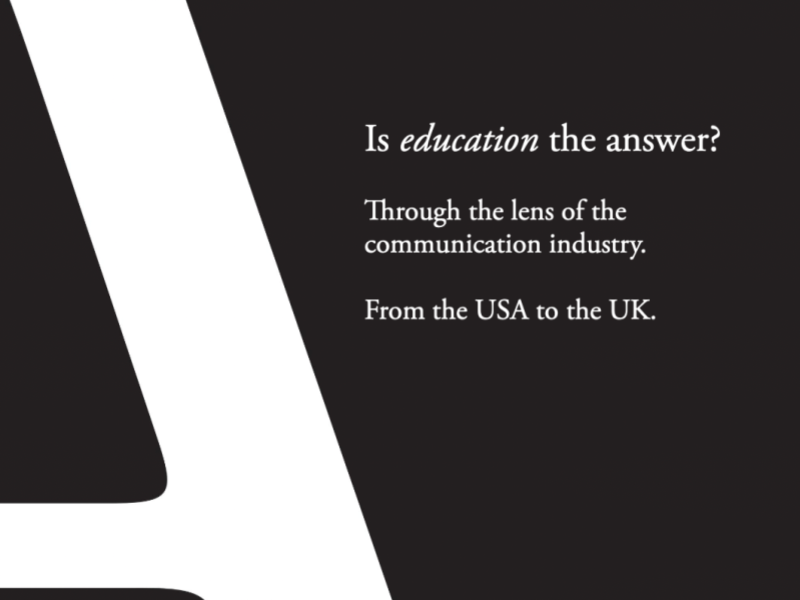Diana Marszalek 06 Mar 2023 // 8:07AM GMT

NEW YORK — As business grapples with challenges from ESG reporting to misinformation, the comms industry has a key opportunity to address polarization around such issues by promoting learning among stakeholders — starting from within, according to a new report from UK advisory firm One Question.
"Disagreement isn’t a problem. The issue is that we don’t debate based on a common set of facts, and the key to resolving this is education," MikeWorldWide founder and CEO Michael Kempner said. "The more we can educate stakeholders, the greater chance we’re going to let true facts versus alternative facts rule the day. If we can’t determine what is information, then it is impossible to find the truth — and there is no way to do that except through education."
Kempner’s comments, included in the report, were part of two 2022 conversations with comms industry and business leaders — one in New York, the other in London — that explored the responsibility of business in educating society. MWW and PRovoke Media partnered with One Question on the initiative.
Broadly, participants in both the US and UK agreed that communicators do have a role in promoting learning, particularly as their responsibilities have grown to encompass increasingly complex issues — the workplace, ESG, societal and political challenges among them — across the full range of stakeholders.
But not without doing so judiciously, said Pfizer chief corporate affairs officer Sally Susman.
“Education is certainly at the root of the answer of all sorts of things. The thing that Pfizer does best is make breakthroughs that change patients’ lives. That’s what I think is the best, highest use of our talent and resources. And while I think that the responsibility to solve for other challenges certainly exists among us, corporations must ensure their decisions on whether or not to wade into issues are based on very strong corporate values and not socio-political pressures,” Susman said.
Participants' consensus was that companies must focus their efforts within their organizations before going public. Companies that don’t have employees’ buy-in on — or at least understanding of — their positions on big issues expose themselves to reputational risk, comms leaders said.
In addition, industry leaders by and large see learning — individuals transforming information and experience into knowledge and attitudes — versus more systematic education as the means for accomplishing that.
“The education that we’re increasingly doing is through storytelling to our people, bringing to life our values through examples and case studies. It’s a question of bringing people on a journey with you so you create a culture and a mindset, that hopefully connects to the organization and leaves you in a good position when a crisis happens. Then if you need to comment on something, you’ve laid the foundation rather than poking your head up and coming out with something that feels random,” said Fiona Robinson, Deloitte’s North and South Europe purpose lead.
Participants cautioned, though, that using the right approach with the right audience is key — something many companies have yet to figure out.
“Over the last five years, we’ve found the companies and corporations that have the biggest reach, and therefore present the best opportunities, do not want to engage in education in a way that is actually meaningful,” said Run for Something co-founder and executive director Amanda Litman. “In fact, they often spend their money in a way that is counterproductive, which is its own separate ball of wax.”
Former LinkedIn marketing leader Elizabeth Knights-Ward added: “Having recently moved into climate tech, I’ve never worked in an industry so convinced of the necessity of education, yet so unclear about what that education should look like. We talk a lot about the education gap in terms of the public as a way of explaining why people aren’t buying into our mission, but I wasn’t prepared for what it would mean to educate a market that either doesn’t get it because they haven’t been exposed to it, or because they don’t want to get it. Whether we like it or not, climate change is a political issue and people have become polarized.”
All of which points to another theme underscored by the discussion: that the need for education, or learning, is as important at the top as it is at the bottom of organizations. Figuring out how to execute it properly is likely to be a work in progress for some time.
“Actually, good leaders don’t have the answer. Why? Because they’re still learning. Maybe the best leadership comes from the people who are prepared to admit that — to say, I’m purposeful in my learning to progress because the world is changing around me and I’m going to change the world with it. It doesn’t come from these absolute positions of authority or knowledge” said James Scroggs, chair of One Question.
Said Crisis Text Line CMO Mishka Pitter-Armand: “I do think that education, in the sense of equal access to information, can be the answer. That information isn’t always going to be right, but if each individual in a dialogue has the agency to criticize it, and the other person in that exchange has the empathy to recognize that they are not always right, that’s the world I want to see.”


































.jpg)


















